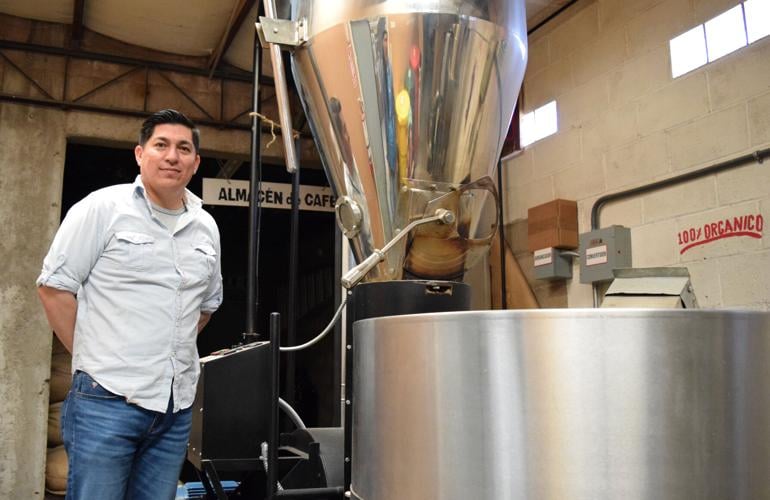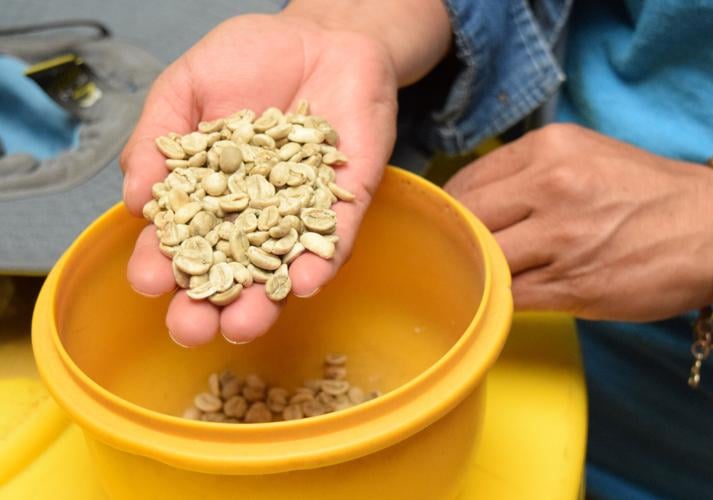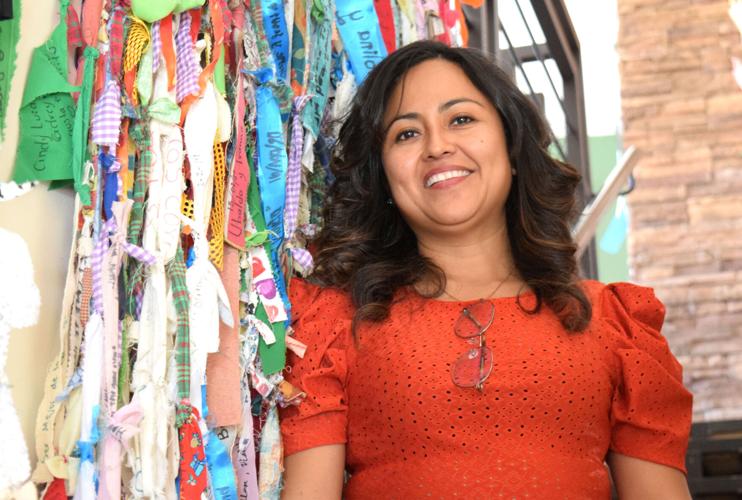Arizona Daily Star border reporter Danyelle Khmara speaks to people who hold a stake in the borderlands — who work, live, travel and migrate in the Arizona-Mexico border region or whose lives are affected by immigration and border policies.
In this occasional series, Khmara brings readers the voices and stories of those people to illuminate what life is really like on the border.
Here she talks to two people who work at the coffee cooperative Café Justo, in the Sonoran border city Agua Prieta, about 120 miles southeast of Tucson. They have both watched the small business grow into something that could be part of the solution to keeping families together in their homes rather than migrating out of necessity.
'Providing an option for them'
Adrian Gonzalez was in his early 20s when he started working at Café Justo. He heard about the coffee cooperative through the Presbyterian Church in Agua Prieta, Sonora, where he is a member.
He knew nothing about coffee. When asked in the initial interview if he knew how many varieties of coffee there were, he said, “Sure, regular and decaf.”
It was 2002, and the cooperative had rented a small house with a single roaster, a small mill and a computer. It was in its first year and still just an idea, started by a group of 25 coffee farmers from Southern Mexico and a $20,000 loan from Frontera de Cristo, a binational ministry with the Presbyterian Church.
In the very beginning, they weren’t moving more than 100 pounds of coffee a month, Gonzalez says. Now, they sell at least 1,500 pounds a week.
The project was born out of a need.
As the profits from producing coffee dropped, coffee farmers and workers began migrating from Chiapas in Southern Mexico, where many made their living growing coffee, to border towns like Agua Prieta, where there was work in the maquiladoras. These mostly U.S.-owned factories receive tax breaks and take advantage of the cheaper labor of Mexico to make products to be exported. And when some maquiladoras left for cheaper labor in Asia and Central America, more people who lost their livelihoods began migrating, undocumented to the U.S.
Gonzalez was born in Agua Prieta, and he’s seen the city transform from a city of less than 30,000 habitants to nearly 100,000.
Growing up in Agua Prieta, Gonzalez remembers crossing the border after school with his friends, hopping a small barbed wire fence to swim in the Douglas public pool. On the way home, they often ran into Border Patrol, who would offer to give them a ride back to the Mexican side of the line.
Going to Douglas was just like going to another part of the city, Gonzalez says. The wall changed that.
“We felt like Douglas and Agua Prieta were the same city, the same community,” he says. “Obviously when they started to build the wall, well you no longer feel welcome. I understand the reasons, but it did transform the border and had many types of impacts.”
Like most Arizona border towns, main streets in Agua Prieta run right up against the border wall. In some spots, artists have painted murals — color and life on top of rust-colored steel bollards.
Gonzalez remembers when Café Justo started. Coffee farmers arrived in Agua Prieta looking for work because they couldn’t support their families or educate their children. Many came to the border because they knew there was work with the maquiladoras. And when the maquiladoras weren’t enough, many began to make the ever more treacherous journey across the border.
Today about 100 families are impacted directly or indirectly by Café Justo. Gonzalez is an employee of the farmers, who own every aspect of the business.
“A $20,000 loan is keeping over 100 families here in Mexico, where they want to be anyway,” Gonzalez says. “And you compare that to all the millions of millions of dollars that are being put into building the wall and the border security that clearly is not working.”
At the end of this year, the organization will have its 20th anniversary.
“Just receiving a fair price for coffee isn’t the solution for the coffee growers,” Gonzalez says. “You have to empower them. Make them understand that they can be more than just coffee farmers. They can be business owners if they want to be. So that is the idea behind Café Justo — reduce the flow of immigration to the United States, providing an option for them.”
While most of the farmers are in Southern Mexico, the roaster is on the border because 95% of their customers are in the United States. Many are church organizations, as well as a few cafes, food co-ops and small bed-and-breakfasts.
Recycled boxes are piled up in the back room of Café Justo, packed with 1,500 pounds of freshly roasted coffee. Labels advertising things like Mexican cookies and Fruit of the Loom are covered over with addresses, ready to ship to cities in Arizona, New Mexico, Colorado, Illinois, New York and many more.
They have at least one customer in every state now and a few in Canada, Gonzalez says. Because of their connection with Frontera de Christo, their first customers were Presbyterian churches. But now many other denominations are participating — Episcopalians, Catholics, Mennonite and Quakers.
“Pretty much everyone that likes coffee serves coffee in the churches,” Gonzalez says. “If they’re getting coffee for their members anyways, why not get it from a store that is keeping the families together in Mexico?”
A 5-pound bag of coffee is labeled with the date the coffee was roasted, the type of coffee and the name of the farmer. It’s all about building relationships and connection, Gonzalez says.
Every year in November they take a group of people to Chiapas to meet the farmers and learn all about the coffee processing. Some people who go have been watching the names on their coffee bags and get to meet that farmer who has been growing it.
Gonzalez speaks at universities, churches and other organizations in the U.S. to share the project and vision of Café Justo, and that this model can be used with other products besides coffee.
Along with keeping families together, Café Justo is leading to reverse migration, he says.
People who have left are returning back to these communities because they have opportunities they didn’t have before. As well, farmers can afford to hire locals, not just from Mexico but also from Guatemala, to work in the farms so their children can go back to school and get an education.
“Many of them are already graduating, becoming nurses, doctors, teachers, engineers. I mean, whatever they want,” Gonzalez says. “What they have now that they didn't have before is opportunities, options.”
Gonzalez joined Café Justo because he wanted to be a part of something that helps people.
“Independent of the salary or job you can have, if you’re participating in something that is for the common good, it’s very gratifying,” he said.
While border issues are so often seen through a politically divided lens, Gonzalez says the beauty of this project is that whether you are liberal or conservative, it's a win-win situation.
“When it comes to border issues, you want people to be together with their families, especially if you're religious,” he says. “And this just makes sense. If you don't want people to come over to your country, then by all means support ideas like this.”
As Gonzales has watched his community change, separating in half what he grew up thinking of as one community, some things don’t change.
“A wall is never going to dictate the way that we relate to each other,” he says.
“Finding common ground, common ideas and ways to exchange and collaborate together, that's how we are gonna be able to relate to each other.”
'You always have the opportunity to overcome or to grow'
It’s Carmina Sanchez’s birthday. The 30-something laughs at herself as she shows off her curls, thick ringlets falling around her shoulders, which she did for the occasion. She talks with her colleagues in the little Café Justo office behind the industrial coffee roaster and boxes of coffee piled high, ready to be sent across the country.
Friends arrive for the impending party. Teens and families come by and say hello.
Sanchez is the secretary for Café Justo y Más — the Café Justo coffee house that opened in 2016.
Her duties include taking orders, payments and doing the paperwork to export the coffee. But the title does little to describe the impact she has on the place, and vice versa.
Sanchez has worked full time with Café Justo for eight years, but she was also there in the very beginning, nearly 20 years ago, roasting coffee in a pan over a little gas stove with her mother and a few other women, creating samples to send to prospective clients.
Sanchez is from Salvador Urbina, in Chiapas — a small community that primarily grows coffee and home of the farmers who started Café Justo. She migrated to Agua Prieta when she was just a teenager.
Her father was working in the coffee farms, and life in Chiapas was getting very hard, she says. It was the late ’90s, and the price of coffee had devalued so much that the owners of the coffee plantations were just doing the work themselves or even losing their livelihoods.
Her dad decided to go north where he heard there was work in the maquiladoras. A year later, when Sanchez was 16, he came for her and her older brother. Soon after, her mom and other siblings joined them in the border town.
It was 1998, and Sanchez stopped going to school and got a job in a maquiladora, making seat belts. It was common that teenagers where she was from stopped going to school, she says. She worked at the same factory as her father. He worked at night, and she had the day shift.
The work was hard, 10-hour days on her feet with very few breaks and very repetitive tasks, like a robot, she says.
It was her first job. And she loved it.
“It was the first time I had money, in my own hands,” she says. “And honestly, I didn’t know what to do with the money. When I got my first payment, I took my parents out to eat dinner. I’ll never forget it, and neither will they.”
Back in Chiapas they sometimes struggled to have enough food. They ate a lot of beans and simple meals, and on special occasions had chicken, maybe a mole, a traditional Mexican sauce usually served over meat.
“We also ate iguana,” Sanchez says, laughing. Her dad liked to hunt, and when they didn’t have enough food, he might catch an iguana for dinner or go fishing.
Moving to Agua Prieta was a huge change. Sanchez left behind a large family of aunts, uncles and cousins. And coming from the tropics of Chiapas, being surrounded by desert was shocking.
When she first arrived, she lived in a house with as many as 20 people who were from the same region as her and had also come to work in the maquiladoras. The house only had a couple rooms, and they hung blankets to create a modicum of privacy.
Sanchez eventually got married and had two children, a boy and a girl. And she kept working in the maquiladora. Her husband worked at night while she kept the day shift.
Then the maquiladoras started closing, moving elsewhere for cheaper labor. And Sanchez lost her job.
“It was a very difficult time because it was a very big factory,” she said. “Many people were without work, and they migrated to the United States. Many people migrated, and one of them was my dad.”
Café Justo was starting then, and Sanchez’s mom taught her to roast the coffee.
She was getting paid 10 pesos for each pound of coffee she roasted, the equivalent at the time of less than one U.S. dollar, which took about 40 minutes. Still in its infancy, they were seeing if the idea would work.
Eventually, Sanchez found another factory job, packing tomatoes.
Years later, she heard there was a job at the new coffee house Café Justo was opening, and she got it. She started with packaging coffee and was taking on more responsibility when the secretary was leaving, and they offered her the job.
Sanchez laughs remembering how nervous she was accepting it.
“I thought, why did I say yes? I was afraid because I felt like I didn't know that much,” she says. “But I can tell you that over these years, I have grown so much. Café Justo has taught me so many things.”
Being a part of Café Justo taught her there are no limits, that si, se puede, she says.
Sanchez taught herself to use the accounting program for the coffee house. The instructions were all in English, which was harder for her to understand, but she found a way. Besides learning to manage aspects of the cafe, working with Café Justo helped open her mind, she says.
“It doesn’t matter where you came from,” she says. “You always have the opportunity to overcome or to grow while you’re alive. You don’t have to be afraid. Or if you are afraid, face your fears so you can win, grow as a person, learn. I have learned so so much.”
And just like Café Justo, the coffee house served a need that she and others saw in the community. There were more drug issues in the city, and teens and children were vulnerable. So first off, the cafe opened to be a safe space for teens and youth where they could do school work, connect and express themselves creatively.
As well, the coffee house hires people from a substance-abuse treatment center in Agua Prieta. Café Justo y Más is a place where they can have work that’s meaningful and be part of a community, Sanchez says. When there is a job opening, they offer it to patients of the treatment center first.
The cafe has been such a success and they are looking to expand and franchise it, hopefully in the United States.
“For me, I am very in love with the project of Café Justo, to help the farmers and my countrymen in Chiapas,” she said. “And also, I love the project of Café Justo y Más, which I say because I also have teenagers.”
Sanchez’s daughter is 20 now, and her son is 14. Her daughter loves art and takes part in youth events at the coffee house.
People who grow up in the south, sometimes have a mentality that’s a bit closed, Sanchez says. It was new to her to interact with people from northern Mexico and the U.S. People had different ways of communicating and traditions she wasn’t used to.
“All of this was walls that we had to break,” she says. “Now, I love the people from here and also the desert.”
Sanchez hikes and rides her bike in nature and on the outskirts of the city.
“I realized that here, there is also life,” she says. “I’m talking about the nature but also saying that one can grow outside their home. You arrive with fear — What’s out there? Where are we going to live? Where are we going to work? — but here, there is the opportunity to grow. And so here we are.”







